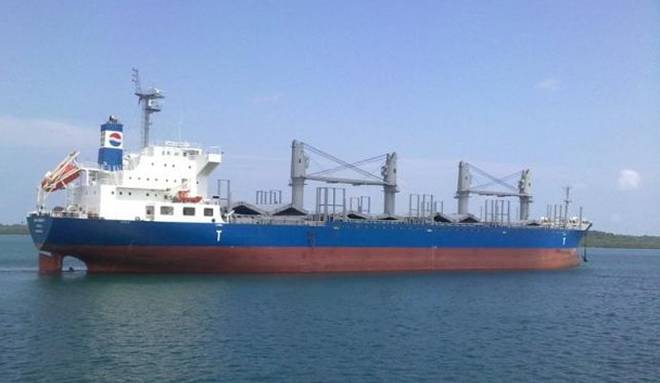Ensuring maritime security
To say that the Maritime security is very important to the nation’s economy will be putting it mildly. The maritime is in fact the heartbeat of the economy. This is because it accounts for over 80 per cent of our international trade. Also, the nation’s mainstay, which is crude oil is taken out of the […]

To say that the Maritime security is very important to the nation’s economy will be putting it mildly. The maritime is in fact the heartbeat of the economy. This is because it accounts for over 80 per cent of our international trade. Also, the nation’s mainstay, which is crude oil is taken out of the country through the seas and any crisis on our waters will in no little way affect the nation.
Recently, we have been experiencing increase in the price of crude oil which is good for our nation, especially if we can continue to produce enough crude or even increase the number of barrels we churn out daily. It would be recalled that the nation went into recession because of a drop in the price of crude and reduction in the number of barrels of crude oil produced due to unrest in the Niger Delta region.
We, therefore, cannot afford to take for granted the current safety and stability on our water ways. We cannot afford crimes on our water ways, therefore we must do everything possible to ensure that the current efforts at checking criminals are sustained. The need for effective maritime surveillance and operational exigencies cannot be overemphasised. In the past one and a half decades, there has been increasing threat to global security, with the criminals using high seas and inland water ways as their safe haven. Prior to the inauguration of the present administration headed by President Muhammadu Buhari, our nation’s maritime corridors were regarded as one of the most unsafe, with frequent cases of sea robbery, oil theft, piracy and other forms of criminal activities.
On this account, the nation was unable to tap maximally, its full potential from the sectors of transportation, fishing, oil and gas. This trend negatively impacted significantly on our Gross Domestic Product (GDP). This was the scenario before the current Chief of Naval Staff, Vice Admiral Ibok-Ette Ekwe Ibas assumed office. So far, Naval personnel, through the able leadership of the current Chief of Naval Staff, have been doing a lot to secure our water ways to maintain a level of stability, ensure that oil is not diverted by pirates and to also ensure that foreign nationals who have interest in doing business in the country are not scared away by criminals.
The Navy has also been safeguarding our waters to ensure that the enemies do not sneak into the country through that channel. Several proactive and demonstrated commitments have been asserted to ensure that the Nigerian Navy is professionally positioned, competitive and motivated to drive its primary responsibilities. These include intensified surveillance and patrol at operational choke points. The leadership of the Nigerian Navy has deliberately undertaken several operations though not limited to “Tsura Teku” in Warri, Delta State, to rid the nation’s water ways of robbery, piracy and illegal oil bunkering. Several ships, gun and patrol boats have been acquired and deployed for maritime security drills, demographic intelligence and operations. The Navy leadership also commenced a sea and back water exercise, code named “Octopusgrip” in Onne, Rivers State. That was in addition to “Operation Rivers Sweep” intended to ensure a 24-hour surveillance on the nation’s maritime domain.
As a result of these measures, the Command, between May and September 2017, seized and destroyed about 870 metric tonnes of illegally refined crude oil. Also, 400 illegal refineries were destroyed along with 85 boats used by oil thieves. The Nigerian Navy has ensured that no vessel goes in and out of the Nigerian creeks without being interrogated through the introduction of a choke point control regime. It is gratifying to note that the Navy has sustained its dominance at sea and back waters by daily deployment of ships and boats within the area of responsibilities of each of the Commands.
These efforts have earned the Nigerian Navy international recognition and positive rating arising from its stellar performances though not limited to the successful rescue of a French warship during last year’s military exercise. Those perpetrating maritime crime have now realized that it is no longer business as usual as statistics have shown a remarkable reduction in occurrences of piracy and sea robbery. Operators in the maritime sector say these measures have subsequently provided conducive environment for the sustenance of economic activities, including oil and gas production, safety of shipping and other maritime activities.
The successes recorded in the last two and half years were as a result of the visionary and purposeful leadership of the President and Commander in Chief of the Nigerian Armed Forces, Muhammadu Buhari, who has continued to wage a relentless war against corruption, and has re-positioned the Armed Forces for greater service delivery. The President must also be commended for the tenure renewal of the current Service Chiefs, a move many Nigerians believe, will consolidate the efforts so far made. It is hoped that the Nigerian Navy will continue to receive the support of all Nigerians in line with its age long slogan of Onward Together.
Also, as the Chairman of the House of Representatives Committee on Navy said recently during an oversight inspection of Housing Units constructed by the Navy in Calabar, Cross River State, there is need for increased budgetary allocation to the Nigerian Navy to enable it to consolidate on its lofty programs and successes occasioning stable oil production regime especially now that international oil price has remarkably improved. All efforts must be made to ensure sustainability of the peace and security on our waterways, as that will translate into an improved economy.
Sunnie Harries is a public affairs commentator
